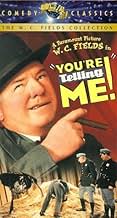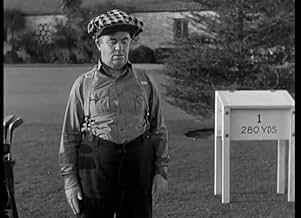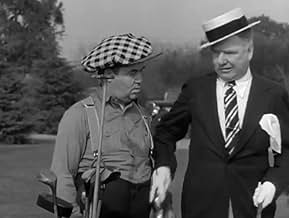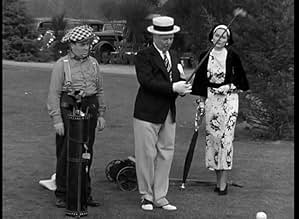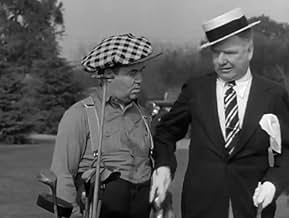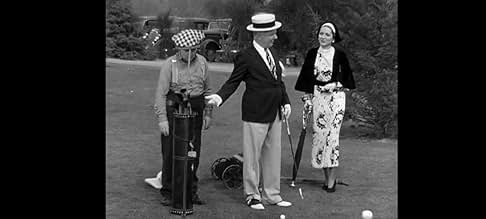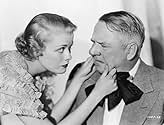IMDb रेटिंग
7.4/10
1.2 हज़ार
आपकी रेटिंग
अपनी भाषा में प्लॉट जोड़ेंA hard-drinking, socially-awkward inventor wrecks his daughter's chances of marriage into a rich family and bungles his own chances of success by selling one of his more practical inventions... सभी पढ़ेंA hard-drinking, socially-awkward inventor wrecks his daughter's chances of marriage into a rich family and bungles his own chances of success by selling one of his more practical inventions.A hard-drinking, socially-awkward inventor wrecks his daughter's chances of marriage into a rich family and bungles his own chances of success by selling one of his more practical inventions.
- पुरस्कार
- कुल 1 जीत
Buster Crabbe
- Bob Murchison
- (as Larry 'Buster' Crabbe)
Dell Henderson
- Mayor
- (as Del Henderson)
Robert McKenzie
- Charlie Bogle
- (as Robert Mc Kenzie)
William Bailey
- Tire Company Executive
- (बिना क्रेडिट के)
Eddie Baker
- First Motorcycle Cop
- (बिना क्रेडिट के)
Dorothy Bay
- Mrs. Kendall
- (बिना क्रेडिट के)
Harold Berquist
- Doorman
- (बिना क्रेडिट के)
Don Brodie
- Waiter
- (बिना क्रेडिट के)
Elise Cavanna
- Sarah Smith - Female Gossip
- (बिना क्रेडिट के)
फ़ीचर्ड समीक्षाएं
10Tashtago
It's amazing how much got squeezed into this 66 minute film. "You're Telling Me" contains some of Fields best work. The golf routine at the end is classic, although a little shorter than in the previously filmed "the Golf Specialist" which features a different and even more revolting caddy. What I noticed on seeing this film again after many years is what a good actor Fields is, especially in the scene where he talks the princess out of suicide. The supporting cast is also very good especially the aforementioned Kathleen Howard. No other comedian could get away with the scene where Fields knocks himself out with one of his inventions and two scenes later is still unconscious. As a Fields fan this a 10. Favorite line: "Your alright Mayor, I voted for you in the last election...five times."
Does anyone out there know where I can find a copy of "Man on the Flying Trapeze" ? Any information is much appreciated.
Does anyone out there know where I can find a copy of "Man on the Flying Trapeze" ? Any information is much appreciated.
YOU'RE TELLING ME? (Paramount, 1934), directed by Erle C. Kenton, adapted from the story "Mr. Bisbee's Princess" by Julian Street, stars W.C Fields in his first domestic comedy since his silent comedy days of the late 1920s, reprising the character he originated from SO'S YOUR OLD MAN (Paramount, 1926). In spite of some script alterations, ranging from the invention of unbreakable glass to punctured proof tires, the basic premise remains the same. As in most comedies displaying Fields the family man, he's a lovable father worshiped by an offspring, in many instances, his daughter, looked upon by his spouse as a miserable failure, until success comes his way for his wife to have a new outlook on him. While she may still appear to have lost interest in him, she hasn't lost her pride by elevating herself to the level of her husband's rewarded success.
For the basic plot: Samuel Bisbee (WC Fields) lives in a small town of Crystal Springs. He supports his wife, Abigail, (Louise Carter), formerly Abigail Warren of the acclaimed Warrens of Virginia, and daughter, Pauline (Joan Marsh). Sam is an optometrist who spends most of his time working on several inventions at the shop. In between his intervals, he gets together with the neighboring husbands enjoying themselves drinking liquor. Aside from domestic problems involving Pauline's love for Bob Murchinson (Larry "Buster" Crabbe), son of society snob, Mrs. Edward Quimby Murchinson (Kathleen Howard), who disapproves of their relationship, especially after meeting her father. As everything seems to fail, Bisbee gets a registered letter from the National Tire Company asking for a demonstration of his latest invention, a punctured-proof tire. Things go wrong when his automobile, equipped with the punctured proof tires, parked in a non-parking zone to be towed during Bisbee's absence and substituted by the same make and model police car. Bisbee demonstrates the puncture proof tire to Mr. Robbins (George Irving) by shooting at them, only to witness tires going flat one at a time. Foiled again, Sam takes the next train home. Depressed, he decides to commit suicide, leaving his wife a note before swallowing some iodine, but instead, mistakes a woman passenger (Adrienne Ames) with a bottle of iodine with intentions of doing the same thing, thus "saving her life." Unaware that she's the famed Princess Lescaboura traveling incognito, he befriends her in her cabin, telling her his life story. Seen together by town gossips, rumor spreads about Bisbee's secret rendezvous on the train with an attractive woman. Finding Bisbee in need of encouragement, the princess helps him by coming to Crystal Springs, surprising, in fact, shocking the people of her sole purpose being to visit her "good friend," Samuel Bisbee, the one who "saved her life in the war."
A domestic comedy with its ups and downs, is definitely a WC Fields showcase from his unsuccessful to successful inventions; attempt to make up with his wife a giant Ostrich as a gift; to his climatic golf game lifted from one of Fields' many comic supplements originated on the stage, and duplicated in his comedy short, THE GOLF SPECIALIST (1930), this time with Tammany Young as the caddy stooge.
Kathleen Howard, famous for pairing as Fields' shrewish wife in both IT'S A GIFT (1934) and THE MAN OF THE FLYING TRAPEZE (1935), makes her initial appearance with him here. Louise Carter, a physically fragile looking woman, as the domineering wife, shows her lack of love for her husband when in one instant, is told by the visiting Princess, "I think you're the luckiest woman in the world." Mrs. Bisbee asks, "Is my husband dead?" "Buster" Crabbe, the famed swimming champion who scored success as Kaspa, the lion man, in KING OF THE JUNGLE (Paramount, 1933), and the chaptered serial, TARZAN THE FEARLESS (1933), ranks one of the stronger supporting names ever credited in a Fields comedy, yet his secondary role, gives him little to do, especially during the climatic golf game sequence where all he does is look on approvingly and smile. Joan Marsh as Bisbee's daughter, with hairstyle and features resembling Mary Carlisle, another Paramount starlet, has her limitations as well. Adrienne Ames as the princess, addressed as "Marie" by Bisbee, comes off better, as the sympathetic character who helps Sam Bisbee regain his confidence and respect from his family and townspeople. She's the one who uses the titled catch phrase, "You're telling me?"
YOU'RE TELLING ME? is a sort after Fields comedy. Once unavailable for viewing, it finally surfaced on commercial television in the late 1970s, which, by then, was a totally unfamiliar Fields comedy. Prior to that, when TV Guide had the title "You're Telling Me" listed, it turned out to be not the Fields edition but a Universal 1942 comedy bearing the same title starring Hugh Herbert. The Fields edition gained its recognition when presented, along with other Fields/ Paramount comedies, on American Movie Classics (1992-93). Out of circulation for nearly a decade, YOU'RE TELLING ME?, which has since been distributed on video cassette, received some further exposure on Turner Classic Movies (2001-2002).
As with themes to many Frank Capra comedies about the common man, "No man is a failure ... when he has friends," this goes for Samuel Bisbee who finds the true friendship with Princess Lescaboura, proving to him that he, in true essence, is not a failure at all. YOU'RE TELLING ME? is an enjoyable 66 minutes,not only displaying Fields' comedic talents as inventor who's no Thomas Edison, but a family man with a sympathetic nature, even when sneaking in drink or two. You're telling me? (**1/2)
For the basic plot: Samuel Bisbee (WC Fields) lives in a small town of Crystal Springs. He supports his wife, Abigail, (Louise Carter), formerly Abigail Warren of the acclaimed Warrens of Virginia, and daughter, Pauline (Joan Marsh). Sam is an optometrist who spends most of his time working on several inventions at the shop. In between his intervals, he gets together with the neighboring husbands enjoying themselves drinking liquor. Aside from domestic problems involving Pauline's love for Bob Murchinson (Larry "Buster" Crabbe), son of society snob, Mrs. Edward Quimby Murchinson (Kathleen Howard), who disapproves of their relationship, especially after meeting her father. As everything seems to fail, Bisbee gets a registered letter from the National Tire Company asking for a demonstration of his latest invention, a punctured-proof tire. Things go wrong when his automobile, equipped with the punctured proof tires, parked in a non-parking zone to be towed during Bisbee's absence and substituted by the same make and model police car. Bisbee demonstrates the puncture proof tire to Mr. Robbins (George Irving) by shooting at them, only to witness tires going flat one at a time. Foiled again, Sam takes the next train home. Depressed, he decides to commit suicide, leaving his wife a note before swallowing some iodine, but instead, mistakes a woman passenger (Adrienne Ames) with a bottle of iodine with intentions of doing the same thing, thus "saving her life." Unaware that she's the famed Princess Lescaboura traveling incognito, he befriends her in her cabin, telling her his life story. Seen together by town gossips, rumor spreads about Bisbee's secret rendezvous on the train with an attractive woman. Finding Bisbee in need of encouragement, the princess helps him by coming to Crystal Springs, surprising, in fact, shocking the people of her sole purpose being to visit her "good friend," Samuel Bisbee, the one who "saved her life in the war."
A domestic comedy with its ups and downs, is definitely a WC Fields showcase from his unsuccessful to successful inventions; attempt to make up with his wife a giant Ostrich as a gift; to his climatic golf game lifted from one of Fields' many comic supplements originated on the stage, and duplicated in his comedy short, THE GOLF SPECIALIST (1930), this time with Tammany Young as the caddy stooge.
Kathleen Howard, famous for pairing as Fields' shrewish wife in both IT'S A GIFT (1934) and THE MAN OF THE FLYING TRAPEZE (1935), makes her initial appearance with him here. Louise Carter, a physically fragile looking woman, as the domineering wife, shows her lack of love for her husband when in one instant, is told by the visiting Princess, "I think you're the luckiest woman in the world." Mrs. Bisbee asks, "Is my husband dead?" "Buster" Crabbe, the famed swimming champion who scored success as Kaspa, the lion man, in KING OF THE JUNGLE (Paramount, 1933), and the chaptered serial, TARZAN THE FEARLESS (1933), ranks one of the stronger supporting names ever credited in a Fields comedy, yet his secondary role, gives him little to do, especially during the climatic golf game sequence where all he does is look on approvingly and smile. Joan Marsh as Bisbee's daughter, with hairstyle and features resembling Mary Carlisle, another Paramount starlet, has her limitations as well. Adrienne Ames as the princess, addressed as "Marie" by Bisbee, comes off better, as the sympathetic character who helps Sam Bisbee regain his confidence and respect from his family and townspeople. She's the one who uses the titled catch phrase, "You're telling me?"
YOU'RE TELLING ME? is a sort after Fields comedy. Once unavailable for viewing, it finally surfaced on commercial television in the late 1970s, which, by then, was a totally unfamiliar Fields comedy. Prior to that, when TV Guide had the title "You're Telling Me" listed, it turned out to be not the Fields edition but a Universal 1942 comedy bearing the same title starring Hugh Herbert. The Fields edition gained its recognition when presented, along with other Fields/ Paramount comedies, on American Movie Classics (1992-93). Out of circulation for nearly a decade, YOU'RE TELLING ME?, which has since been distributed on video cassette, received some further exposure on Turner Classic Movies (2001-2002).
As with themes to many Frank Capra comedies about the common man, "No man is a failure ... when he has friends," this goes for Samuel Bisbee who finds the true friendship with Princess Lescaboura, proving to him that he, in true essence, is not a failure at all. YOU'RE TELLING ME? is an enjoyable 66 minutes,not only displaying Fields' comedic talents as inventor who's no Thomas Edison, but a family man with a sympathetic nature, even when sneaking in drink or two. You're telling me? (**1/2)
It's not often I'll thank a TV network, but Turner Classic Movies deserves heartfelt praise for broadcasting the entire Fields canon this May & June. YOU'RE TELLING ME! has many, many hilarious setpieces and throwaway bits of business - but you'd expect that from William Claude. What might surprise you is his delicate touch when pathos and tenderness are called for. The scene on the train where a despondent Fields, playing struggling eccentric inventor Sam Bisbee, accidentally meets a travelling Princess and tries to talk her out of 'suicide' (she had no such plans...but HE did, in a moment of despair) nearly brought this cynic to tears. It's not the heavy drama of the scene that affects the viewer so much as Fields' flawless playing of it. Plot contrivance it may be, but the easy, simple grace he brings to his line readings - the small, almost imperceptible shadings of wistfulness and regret in his voice, facial expressions & body language - all give testimony to this brilliant comic actor's mastery of craft, and his ability to draw water from the well of his own loneliness. Don't misunderstand; this is a side-splitting comedy. Much of the comedy is purely visual; all of it is unforgettable. But NEVER short-count WC Fields, or confuse him with an impressionist's caricature. Where other clowns tried their damndest to make you laugh till it hurts, Fields knew his gift was to create a character forever set-upon and assaulted by a blithe, uncaring parade determined to pass him by - a man who hurt till all you can do is laugh. Well, you'll laugh all through this 65-minute model of timing and economy; but watching Fields trampled underfoot again, warily rising to his feet with no higher expectation than a brief, sweet respite before his next inevitable shellacking from the fates and furies, you might just get an idea of why they called him 'The Great Man'. Much obliged, TCM.
10gregvw
This is one of the funniest films I've ever seen. Fields stars as Sam Bisbee a liquor-loving inventor who is trying to sell his puncture-proof (actually bullet-proof) tires to a major corporation. The son of a wealthy socialite proposes to Bisbee's daughter, only to be foiled by his mother when she encounters the uncouth Bisbee. On top of ruining his daughter's potential marriage, Sam also loses his car and several other inventions and mistakenly shoots the tires of a police car. The resolution involves a princess, Bisbee running down mainstreet with an ostrich on a rope, and a classic Fieldsian attempt at hitting a golf ball (which somehow results in a pie getting stuck to his hat.)
Do yourself a favor and see this movie!
Do yourself a favor and see this movie!
This is yet another delightful W.C. Fields vehicle which he had already made as a Silent, under the name SO'S YOUR OLD MAN (1926). Actually, the first half of this comedy classic is possibly the best of the four titles I've watched so far from Universal's second Fields set (with several hilarious gags taken by the star as far as they can go); the latter section lacks that initial sparkle, despite its climaxing with his famous golf routine (which had also been the basis of his short THE GOLF SPECIALIST [1930]).
Interestingly, the film combines the star's two basic personality traits: here, he's both henpecked and con-man (playing an inventor of unlikely gadgets). There's the usual romance hindered by class distinction (see also THE OLD FASHIONED WAY [1934]) between Fields' livelier-than-usual daughter - played by Joan Marsh - and future Flash Gordon Larry "Buster" Crabbe; lovely Adrienne Ames brings an exotic touch to the proceedings as a princess who befriends the star on a train (gossiping womenfolk from Fields' hometown think he's having an affair) and determines to 'elevate' his social position. The train sequence is marked by an unexpected poignancy, with the Fields character's intention of committing suicide after blowing his get-rich-quick scheme.
Among the highlights are: Fields ruining his daughter's prospects by his "naïve gauchery" when Crabbe's snobbish upper-crust mother comes visiting; his demonstration of the damage-proof tyre (Fields doesn't realize that his vehicle has been moved and that he's firing at the wheels of a police-car - the scene is capped by the car-radio's announcement of the very 'crime' being committed upon it!); Fields inadvertently drinking from a roach exterminating potion of his own invention but, after turning to the genuine stuff, decides that the former is more to his liking!; when he returns home a failure, Fields tries to soften the blow to his family honor by buying his wife a pet - a large ostrich he's unable to control and ends up losing practically immediately! And the best lines: the "Mrs. Bisbee, you're the luckiest woman in the world" - "Is my husband dead?" exchange between the princess and Fields' wife; the star's remark to the princess about Mrs. Bisbee's "uncalled for sarcasm".
Director Kenton is better known for his horror stuff, notably ISLAND OF LOST SOULS (1933) - also made at Paramount - and such Universal 'B' monster flicks as THE GHOST OF FRANKENSTEIN (1942), HOUSE OF FRANKENSTEIN (1944) and HOUSE OF Dracula (1945); he did, however, helm three above-average Abbott & Costello comedies a decade after making his solo W.C. Fields vehicle.
In conclusion, even if Fields was essentially a Talkie comedian, I still wish that some of the earlier versions of his classic films were more readily available (I'm only familiar with the star's Silent work through his debut short POOL SHARKS [1915], featured on Criterion's W.C. FIELDS: 6 SHORT FILMS disc)...
Interestingly, the film combines the star's two basic personality traits: here, he's both henpecked and con-man (playing an inventor of unlikely gadgets). There's the usual romance hindered by class distinction (see also THE OLD FASHIONED WAY [1934]) between Fields' livelier-than-usual daughter - played by Joan Marsh - and future Flash Gordon Larry "Buster" Crabbe; lovely Adrienne Ames brings an exotic touch to the proceedings as a princess who befriends the star on a train (gossiping womenfolk from Fields' hometown think he's having an affair) and determines to 'elevate' his social position. The train sequence is marked by an unexpected poignancy, with the Fields character's intention of committing suicide after blowing his get-rich-quick scheme.
Among the highlights are: Fields ruining his daughter's prospects by his "naïve gauchery" when Crabbe's snobbish upper-crust mother comes visiting; his demonstration of the damage-proof tyre (Fields doesn't realize that his vehicle has been moved and that he's firing at the wheels of a police-car - the scene is capped by the car-radio's announcement of the very 'crime' being committed upon it!); Fields inadvertently drinking from a roach exterminating potion of his own invention but, after turning to the genuine stuff, decides that the former is more to his liking!; when he returns home a failure, Fields tries to soften the blow to his family honor by buying his wife a pet - a large ostrich he's unable to control and ends up losing practically immediately! And the best lines: the "Mrs. Bisbee, you're the luckiest woman in the world" - "Is my husband dead?" exchange between the princess and Fields' wife; the star's remark to the princess about Mrs. Bisbee's "uncalled for sarcasm".
Director Kenton is better known for his horror stuff, notably ISLAND OF LOST SOULS (1933) - also made at Paramount - and such Universal 'B' monster flicks as THE GHOST OF FRANKENSTEIN (1942), HOUSE OF FRANKENSTEIN (1944) and HOUSE OF Dracula (1945); he did, however, helm three above-average Abbott & Costello comedies a decade after making his solo W.C. Fields vehicle.
In conclusion, even if Fields was essentially a Talkie comedian, I still wish that some of the earlier versions of his classic films were more readily available (I'm only familiar with the star's Silent work through his debut short POOL SHARKS [1915], featured on Criterion's W.C. FIELDS: 6 SHORT FILMS disc)...
क्या आपको पता है
- ट्रिवियाFields' character Bisbee describes a possible scenario involving catching burglars in the basement and drinking with them, a scenario that would be played out in a later film, Man on the Flying Trapeze (1935).
- गूफ़Rosita is brushing Princess Lescaboura's nails and after Rosita says, "But you must.", the Princess' hands are under the table.
- भाव
Sam Bisbee: It's a funny ol' world... Man's lucky if he gets out of it alive.
टॉप पसंद
रेटिंग देने के लिए साइन-इन करें और वैयक्तिकृत सुझावों के लिए वॉचलिस्ट करें
- How long is You're Telling Me!?Alexa द्वारा संचालित
विवरण
- चलने की अवधि1 घंटा 6 मिनट
- रंग
- पक्ष अनुपात
- 1.37 : 1
इस पेज में योगदान दें
किसी बदलाव का सुझाव दें या अनुपलब्ध कॉन्टेंट जोड़ें


